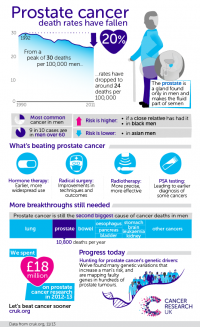Prostate cancer deaths fall by a fifth in the last 20 years

Death rates from prostate cancer have fallen by 20 per cent since the early 1990s according to new figures released by Cancer Research UK.
At their peak in the early 90s, there were around 30 deaths per 100,000 men but this figure has fallen to around 24 deaths per 100,000.
The downward trend is largely as a result of new approaches to treating prostate cancer such as earlier, more widespread use of hormone therapy, radical surgery and radiotherapy, as well as the earlier diagnosis of some cancers linked to the use of the PSA test.
But while this downward trend is good news, more work needs to be done to reduce the number of men dying from this disease even further.
Professor Malcolm Mason, Cancer Research UK's prostate cancer expert based at Cardiff University, said: "This new report shows we've come a long way in improving the treatment of prostate cancer in the last couple of decades. And improvements in how we treat prostate cancer have been key to reducing deaths from the disease. But a lot more work still needs to be done.

"We still don't understand why some prostate cancers turn out be harmless – the grass snakes – while others are aggressive – the vipers – and resistant to treatment. Developing a test that distinguishes between these grass snakes and vipers in prostate cancer patients would help doctors understand which patients are most at risk. Last year Cancer Research UK spent £18million on prostate cancer research which we hope will bring us one step closer to beating this terrible disease."
Each year around 41,000 men are diagnosed with prostate cancer.
Martin Ledwick, Cancer Research UK's head information nurse, said: "The symptoms for prostate cancer are similar to a number of benign and harmless conditions but it's worth being aware of them and getting anything unusual checked out with your GP. Things such as having to rush to the toilet to pass urine and difficulty urinating should be checked out, especially if it's getting you up several times during the night.
"It's also worth remembering prostate cancer is more common in men over the age 60, anyone who has had a relative diagnosed with the disease and men of African-Caribbean descent. If you're worried about prostate cancer or have any questions about this or other cancer-related issues, you can contact the nurse's helpline on freephone 0808 800 4040."
Professor Peter Johnson, Cancer Research UK's chief clinician, said: "We now have more prostate cancer trials and more research programmes happening than ever before. We have also been working especially hard to decode the genetic changes in prostate cancer, which holds great promise for the future. But we can still do more – we need a better screening test, better diagnostics, better treatments – and research is the answer to this challenge".

















